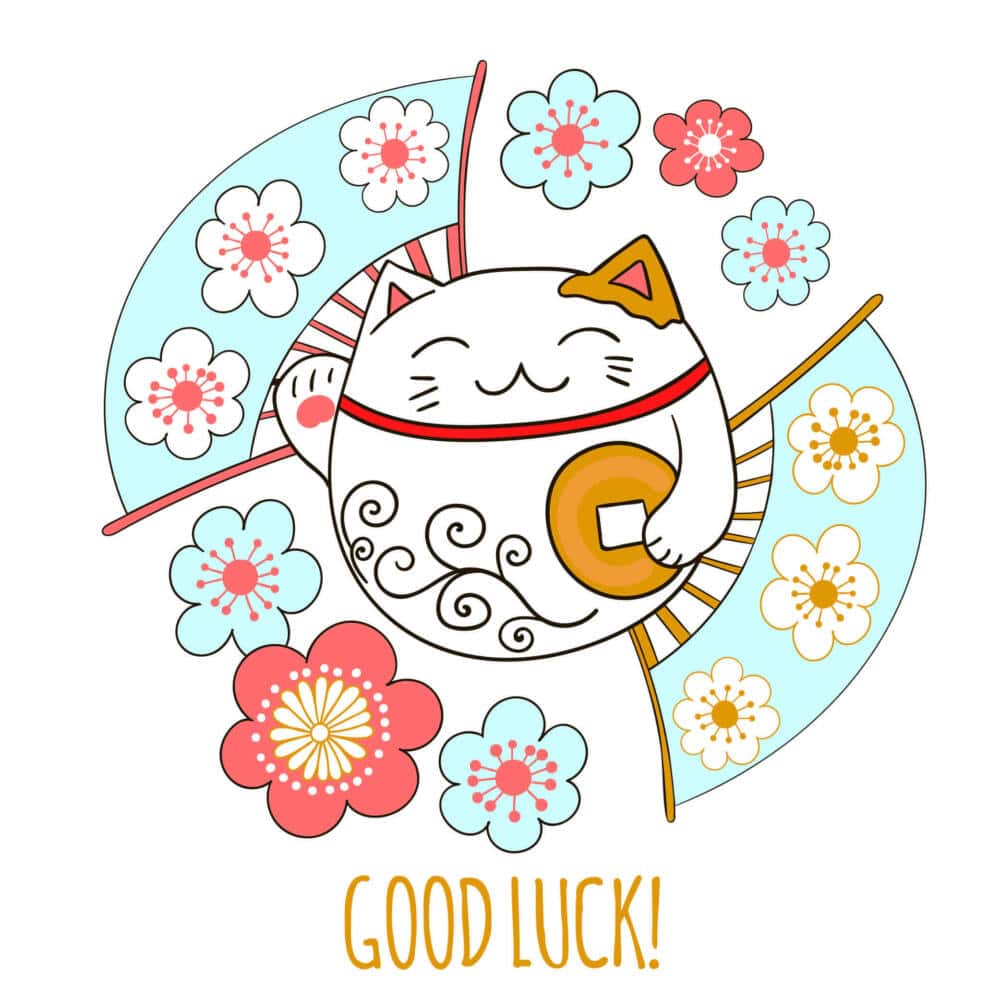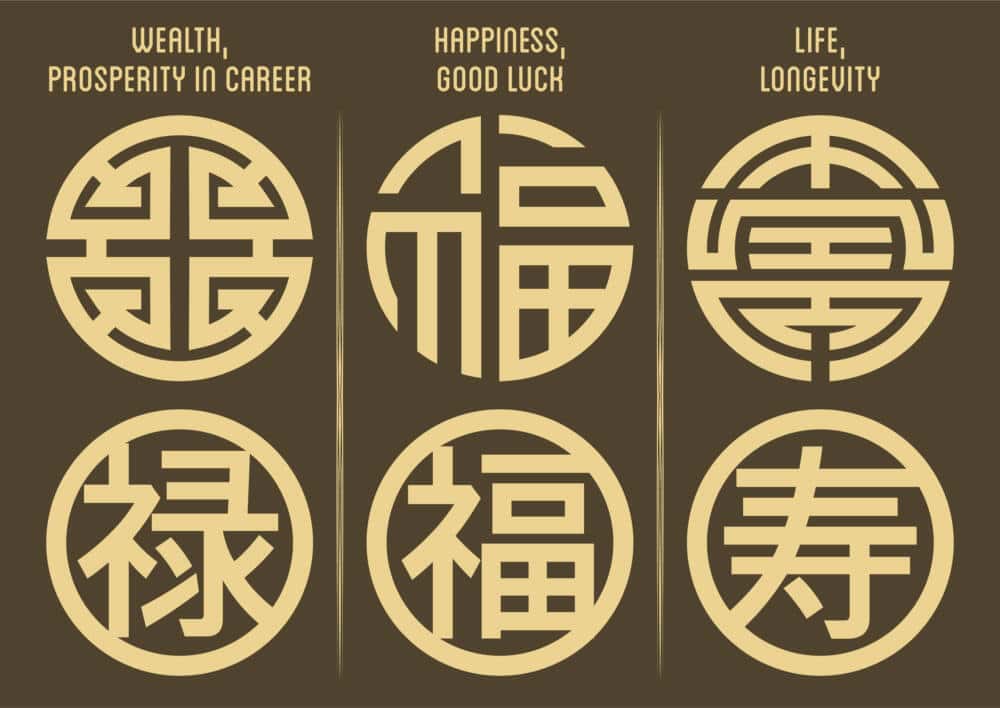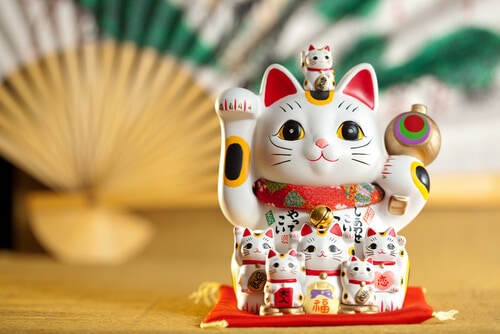In Japanese culture, the word luck and its sentimental meaning holds a great deal of importance. Here are the different ways to say luck in Japanese.
Fortune favors the curious, so enrich your linguistic treasure trove with our guide to the various ways to say "luck" in Japanese. From casual conversations to formal wishes, each expression carries unique nuances and cultural significance. Learn how to invoke good fortune and recognize serendipity in the

10 Different Ways To Say Luck in Japanese
Fuku - 福
- Pronunciation: Foo-K
- Meaning: Luck in Japanese
Fuku is a noun that means good luck in the Japanese language. The ideogram (福) stands for fortune, luck, blessing, and wealth. The kanji can be used in dozens of words that directly or indirectly describe happiness or things connected to luck.
For instance, the Japanese word Fukubukuro stands for ‘lucky bag’ which is an item traditionally sold during the Japanese New Year. This bag contains mysterious items as a surprise for its recipient.
Here are a few words derived and written with kanji from Fuku associated with good luck.
Fukubiki - 福引
- Pronunciation: fuku-biki
- Meaning: lottery, lucky, fortune
An example of this would be というわけで、福引品の中身は卓上クリーナー。 which means That's why the contents of the lucky items are "table cleaners".
Fukutoku - 福徳
- Pronunciation: fuku-toku
- Meaning: fortune, happiness and prosperity
An example of this would be もし、あなたが十分に福徳を修することができたら変わる。 which means If you cultivate enough good fortune, then your situation will change.
Fukushi - 福祉
- Pronunciation: fuku-shi
- Meaning: well-being, insurance
An example of this would be 老人福祉増進の責務 which means Responsibility to Improve the Welfare of the Elderly.
Fukuin - 福音
- Pronunciation: fuku-iin
- Meaning: good news, gospel, good news
An example of this would be 福音メッセージのそれぞれの面は重要です。 which means Each facet of the gospel message is important.
Rakki – ラッキ
- Pronunciation: Ra-KKi
- Meaning: Lucky in Japanese
Rakki is another way to say luck or lucky in the Japanese language. Rakki can also be referred to as an expression of happiness. Here are a few ways to use Rakki in a sentence.
- ラッキーショットだったと 思うか?
Meaning: You think that was a lucky shot?
- 装飾やギフトの考えとしてラッキー竹
Meaning: Lucky bamboo as decoration and gift idea
- 9は彼のラッキーナンバーよ
- Meaning: Well nine is his lucky number.
Engimono - 縁起物
- Pronunciation: En-Gi-Ma-Na
- Meaning: Lucky charm or talisman
Engimono 縁起物 stands for lucky charm or talisman’ in the Japanese language. The term is generic and can refer to anything that is deemed lucky for an individual.
It could be a chain, bracelet, food, dolls, fruits, incense, flowers, and more. Anything that can bring good luck to a person is called Engimono.
Here are a few examples of the usage of Engimono 縁起物.
- 正月の縁起物としても食される。
Meaning: It is also eaten as a lucky charm in the New Year.
- 不老長寿や子孫、商売の繁栄願う日本には欠かせない縁起物のシンボル。
Meaning: This talisman has been a longstanding symbol in Japan for those seeking longevity, perpetual youth, posterity or commercial success.
- そんな伝統的な縁起物をコレクションフィギュアとしても楽しんでもらえるようつくられました。
Meaning: This product was made so that the traditional lucky charm could be enjoyed as collectible figures.
Yatta - やった
Pronunciation: Ya-Taa
Meaning: How Lucky!
Yatta is a very common word in the Japanese language which is used to express a sudden feeling of happiness or euphoria.
For instance, if you are gifted on a special occasion or win a lot of money, then that phrase will include the term Yatta, which is meant to represent happiness. In simple terms, Yatta can be translated as ‘Hooray’.
- それでも やはり 私がやったとは言うのです
Meaning: But nonetheless, they say, "I did it."
- 彼が恐らくやったから それが理由だ
Meaning: Because he probably did it, that's why.
- 良くやった 君もソールも
Meaning: Excellent work, both you and Saul.
Tsuiteru - 付いてる
- Pronunciation: Su-Ei-Ter-U
- Meaning: State of Being Lucky
Tsuiteru is described as the state of being lucky. This verb also has a negative form, tsuitenai which also means bad luck and not out of luck.
The word also means to be attached, to be included, to have, to contain and to be in a state.
Here are a few ways one can use the term Tsuiteru (付いてる) in a sentence.
- どうして今は付いてるの?
Meaning: How come there's tape over his mouth?
- 首に何か付いてるぜ
Meaning: You got something on your neck.
- そうか 学長が味方に付いてるもんな
Meaning: Take your drama someplace else.
Ungaii - 運がいい
- Pronunciation: Un-Ga-Eii
- Meaning: Someone who is lucky
Ungaii is an adjective that is meant to describe someone who is extremely lucky. The Ideogram 運 - un refers to fortune, destiny, advancement, lucky, progress, etc.
The ideogram is also used in words that are directly or indirectly related to luck. Here are a few examples to words that contain the ideogram 運 - un.
- 運良く - unyoku meaning fortunately
- 運命 - unmei meaning destiny
- 運勢 - unsei meaning fortune, luck
The below are a few examples on using the ideogram 運 - un in a sentence.
- 僕はね ホント運がいいだけなんだよ わかる?
Meaning: I'm just really lucky, you know?
- まあ 彼は 君がいて運がいい
Meaning: Well, he's lucky to have you in his life.
- しかし俺は運がいいなぁ。
Meaning: At the immigrations, I was lucky again.
- お前は運がいい アイヴォは生きたままを望んでる
Meaning: You're lucky Ivo wants you alive.

The above are some of the most popular words and phrases attached to them that convey the feeling or emotion of luck in the Japanese language. But that is not all. We have below some more to offer.
These words and example phrases can also be used in the Japanese language to convey luck, good luck, or the sentiment of happiness to the person you are having a conversation with.
Kichi - 吉
- Pronunciation: Ki-Chii
- Meaning: The term Kichi means good luck or good fortune.
Koun - 幸運
- Pronunciation: ko-un
- Meaning: The term Koun refers to good luck in the Japanese language.
An example of this would be 自分の人生に幸運を招くんだ which means Leaving coins out is a way of inviting good fortune into your life.
Shiawase - 幸せ
- Pronunciation: Shi-aa-wa-se
- Meaning: This Japanese word means happiness, but the idea of luck on some occasions
An example of this would be 今時こんな幸せな カップルは珍しい which means It's rare to see such a happy couple nowadays.
Fuun - 不運
- Pronunciation: Uu-nn
- Meaning: This word means bad luck in Japanese
An example of this would be それ以来 一族は不運続きだ which means They've been living in a cloud of bad luck ever since.

Ways To Say Luck in Japanese: FAQs
Do the kanjis in the Japanese language have similar meanings related to luck?
No. The kanji or ideograms in the Japanese language can express different ideas and meanings. This is why if you read the Japanese texts, words, or sentences, you will often come across words that either directly mean luck, or have a somewhat similar meaning to it. Each word or phrase is tied to a special occasion or event.
Is there a specific sentence in Japanese wishing somebody Goodluck?
When we say the words ‘Good Luck’ in English, the recipient takes it as a direct meaning of a wish. The person saying it is wishing them good luck for something that they are about to do, or are going to experience. But in the Japanese language, this can be quite tricky. You see, the Japanese language does not have any specific word that you can add to a sentence and say, this is me wishing you luck.
What is the right way to wish one Good luck?
There are several different ways one can use one Japanese word that would mean luck. This is because Japanese is a complex and vibrant language that has its unique way of utilizing terminology. Lucky for you, if learned and used right, there are several different ways how one can use the term right and wish another person luck.
Why is it interesting to link the words related to luck in Japanese?
It is interesting to analyze the words related to luck because these words are the ones that can be further linked to other words which may or may not have the direct meaning of luck. Every word in Japanese has some of the other links to luck. Whether direct or indirect, some of the most popular examples of words linking to luck are happiness, security, blessedness, prosperity, and more.
Conclusion
The above was a quick and easy rundown of the ways one can use luck in the Japanese language. As said before, the words or parts of the word can be used in different sentences to mean different things.
The words are not exact translations but are mere ways to convey your feelings of luck, good or bad, to another individual by adding them to a phrase.
So, the next time you wish to convey an emotion, wish someone luck, or encourage them to do something, you know exactly what words to use. Good Luck! Or as the Japanese say, Kōun o (幸運を).




